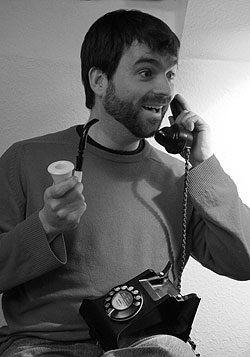The Future of Drama Training?
Some rambling thoughts on the future of drama training.
Please excuse me if I'm talking from a performance based perspective, and don't mention the technical and production based sides of the industry in depth, but I think that the broad ideas of what I'm talking about here apply across the board.
It seems that the conservatoire approach to actor training is very much under threat these days. Look at the storm that the RSAMD recently weathered, and the desperately sad path that QM is following.
What is the future for the potential drama students of 5 or 10 years time (perhaps less)?
How will they be able to start to learn their craft?
Where can they go to get that first foot in the door, to feel empowered and enabled enough to start to explore their creative selves?
I think that some of the most important aspects of a training environment are space, time, security and exposure.
What I mean by these words, if you'll excuse my slightly esoteric ramblings, is:
Space – An actual space to play in and work, a space to learn how things work, a dedicated space that is for theatre training, not a classroom that the computers have to be moved around to get enough room to do anything.
A great space can be just as valuable to the student as the teacher. A space will ask things of you, talk to you, demand that you justify your presence there.
Time – That you get a set block of time, be that years, months, days or whatever that are specifically dedicated to the growth of your craft. Psychologically that's very important for the student actor. Do what you can to survive outside the hours of training, but when you're in the training environment you're there for that purpose, and you better bloomin' well justify your presence there.
Security – The security to fail. Possibly the most important aspect of this train of thought, for me. If you've got dedicated time and space set out to your training, you can then start to apply yourself to it, and to really learn, and, unless you're some sort of phenomenon, you're going to fail and fail again, for other reasosn as your learning progresses. Building on from those failures in a safe environment can give you such a massive frame of reference for the outside world.
Exposure - Exposure to an audience. It's the very essence of the performer's craft. It's where the greatest amount of learning takes place. In a solid establishment the frameworks that you need in place for a performance to happen are there, the student doesn't have to worry about marketing, front of house or anything like that, they rehearse and then they perform. The lucky things.
Take drama training out of such a secure environment, and the suddenly the pressures on the student surely become much greater, and the likelihood of exposure to an audience lessens considerably.
So what is the future for drama training?
Are there other models out there for how a student actor may start to learn their trade?
Do we go down the route of apprenticeships?
There's a lot of governmental talk about apprenticeships these days, but can that be applied to theatre? That would require a reshaping of the funding environment to see such a thing brought out across the board.
There's the oriental model for such a training, and, broadly similar the medieval route. But what would be a good approach for Scotland, now?
A centralised apprenticeship agency or two, providing groundwork classes and then sending apprentices off to study with companies?
Do we see the rise of private theatre schools, following the Lecoq / Gaulier style model, where the students pay large fees and are worked solidly for half the day, then go off for the rest of the day to earn their crust? Mind you, the paying of large fees seems to be a universal thing these days.
Perhaps a school on wheels? A roving set of foundation and skills workshops that travel the country from town to town, meeting for month long bursts of time in village and town halls?
Do theatre companies create short schools?
Does Berty the Magic Theatre Banana go and tap people on the head an make them in to performers?
The one thing that definitely needs to be in place for what ever the future may be is a system of quality approval. The training needs to be of high quality, and the more fractured that the training environment becomes, the harder it may be to assure such quality.
Labels: apprenticeships, Scotland, theatre, training


0 Comments:
Post a Comment
<< Home